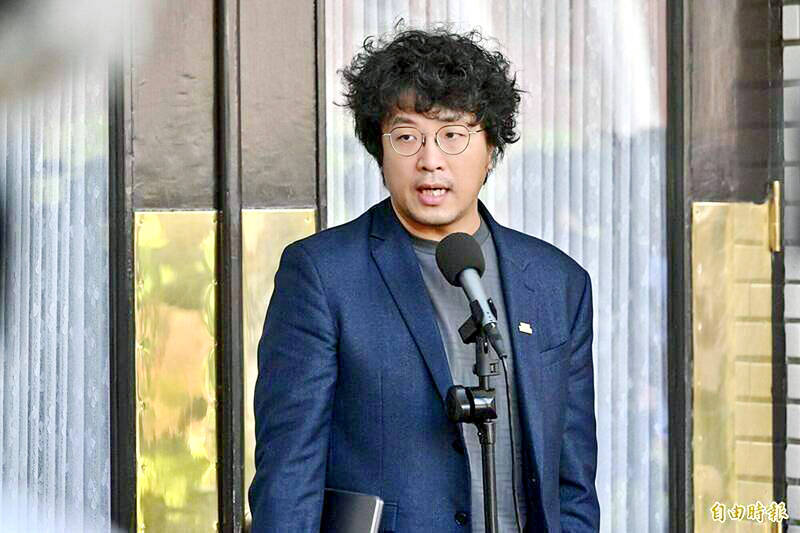The Mainland Affairs Council (MAC) yesterday condemned China’s attempt to assert jurisdiction over Taiwan, after Chinese authorities launched an investigation into Democratic Progressive Party (DPP) Legislator Puma Shen (沈柏洋) for “secession.”
Shen and United Microelectronics Corp founder Robert Tsao (曹興誠) were last year added to Beijing’s list of so-called “die-hard Taiwanese independence activists,” which also includes former premier Su Tseng-chang (蘇貞昌) and Vice President Hsiao Bi-khim (蕭美琴).
In June, Shen’s father’s business was also placed on a sanctions list as punishment for “supporting Taiwanese independence.”

Photo: Taipei Times
Chinese state-run China Central Television yesterday reported that the Chongqing Municipal Public Security Bureau had launched an investigation into Shen for “engaging in activities that undermine national unity” through the establishment of Kuma Academy, which it labeled a “separatist organization.”
The bureau also encouraged the public to report tips, saying that it would keep the identities of whistle-blowers confidential.
“The Chinese Communist Party [CCP] has crossed the line by using its internal laws to build a criminal case against one of our legislators,” the MAC said in a statement. “The CCP has absolutely no jurisdiction over Taiwan, and its so-called laws and regulations have no binding force on Taiwanese.”
“Under the Republic of China [ROC] Constitution, Taiwanese have inalienable freedom and rights. However, the CCP seeks to impose cross-border persecution under the guise of punishing ‘pro-Taiwanese independence advocates.’ Its goal is to divide and threaten Taiwan, but it would surely fail,” it said.
Taiwanese should remain vigilant about their personal safety when traveling to China, as they could be illegally arrested or detained without any legitimate reason, it said.
It also advised the public not to collaborate with the CCP, Chinese government agencies or the Chinese military for personal gain, adding that such actions could contravene national security laws.
MAC Minister Chiu Chui-cheng (邱垂正) also condemned Beijing for using its 22 guidelines to fabricate offenses and criminalize Taiwanese legislators.
The 22 guidelines, announced in June, outline punishments for so-called “die-hard” Taiwanese independence advocates, including provisions that permit lifelong persecution and authorize the Chinese government to exercise long-arm jurisdiction over Taiwanese for making political statements, Chiu said.
They also allow for convictions and even the death penalty to be imposed in absentia, he added.
“The guidelines are an escalation of China’s threats against Taiwan,” Chiu said. “They are designed to intimidate and divide all Taiwanese, not just Shen.”
Shen wrote on Facebook that Taiwanese are “not afraid.”
He said he had only one day earlier analyzed “abnormal signals” that Beijing had been sending.
“Today, China has acted, targeting people who ask questions and defend Taiwan,” he said, adding that the move was in character for the CCP.
By having the Chongqing bureau open an investigation, Beijing’s next move would likely be to issue an arrest warrant and later sentence me in absentia, Shen said.
“It doesn’t matter. In any case, Taiwanese are not afraid,” he said.
Additional reporting by CNA

ALIGNED THINKING: Taiwan and Japan have a mutual interest in trade, culture and engineering, and can work together for stability, Cho Jung-tai said Taiwan and Japan are two like-minded countries willing to work together to form a “safety barrier” in the Indo-Pacific region, Premier Cho Jung-tai (卓榮泰) yesterday said at the opening ceremony of the 35th Taiwan-Japan Modern Engineering and Technology Symposium in Taipei. Taiwan and Japan are close geographically and closer emotionally, he added. Citing the overflowing of a barrier lake in the Mataian River (馬太鞍溪) in September, Cho said the submersible water level sensors given by Japan during the disaster helped Taiwan monitor the lake’s water levels more accurately. Japan also provided a lot of vaccines early in the outbreak of the COVID-19 pandemic,

Kaohsiung Mayor Chen Chi-mai (陳其邁) on Monday announced light shows and themed traffic lights to welcome fans of South Korean pop group Twice to the port city. The group is to play Kaohsiung on Saturday as part of its “This Is For” world tour. It would be the group’s first performance in Taiwan since its debut 10 years ago. The all-female group consists of five South Koreans, three Japanese and Tainan’s Chou Tzu-yu (周子瑜), the first Taiwan-born and raised member of a South Korean girl group. To promote the group’s arrival, the city has been holding a series of events, including a pop-up

TEMPORAL/SPIRITUAL: Beijing’s claim that the next Buddhist leader must come from China is a heavy-handed political maneuver that will fall flat-faced, experts said China’s requirement that the Dalai Lama’s reincarnation to be born in China and approved by Beijing has drawn criticism, with experts at a forum in Taipei yesterday saying that if Beijing were to put forth its own Dalai Lama, the person would not be recognized by the Tibetan Buddhist community. The experts made a remarks at the two-day forum hosted by the Tibet Religious Foundation of His Holiness the Dalai Lama titled: “The Snow Land Forum: Finding Common Ground on Tibet.” China says it has the right to determine the Dalai Lama’s reincarnation, as it claims sovereignty over Tibet since ancient times,

Temperatures in some parts of Taiwan are expected to fall sharply to lows of 15°C later this week as seasonal northeasterly winds strengthen, the Central Weather Administration (CWA) said today. It is to be the strongest cold wave to affect northern Taiwan this autumn, while Chiayi County in the southwest and some parts of central Taiwan are likely to also see lower temperatures due to radiational cooling, which occurs under conditions of clear skies, light winds and dry weather, the CWA said. Across Taiwan, temperatures are to fall gradually this week, dropping to 15°C to 16°C in the early hours of Wednesday